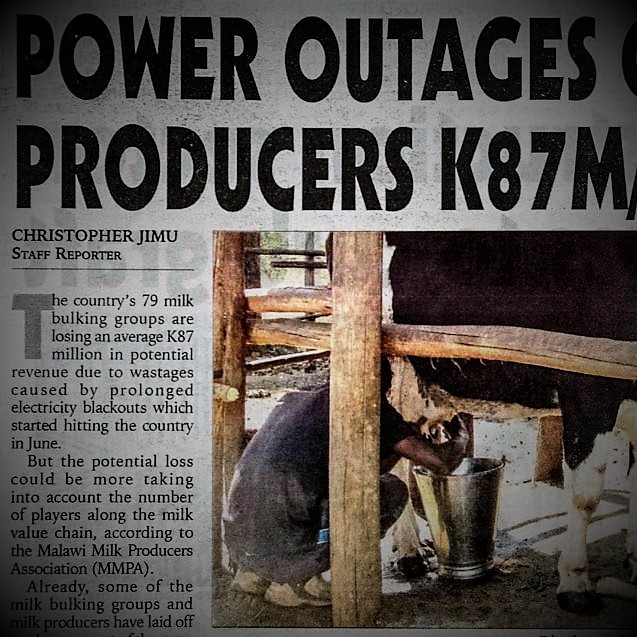
The country’s 79 milk bulking groups are losing an average K87 million in potential revenue due to wastages caused by prolonged electricity blackouts which started hitting the country in June.
But the potential loss could be more taking into account the number of players along the milk value chain, according to the Malawi Milk Producers Association (MMPA).
Already, some of the milk bulking groups and milk producers have laid off workers as most of them are just staying idle.
MMPA national director Herbert Chagona in an interview yesterday said the country needs a quick electricity generation solution to save the dairy industry from crumbling.
“Milk is perishable as such it requires long hours of cooling at right temperatures. The right storage temperature is four degrees Celsius and this is the refrigeration temperature, but where there is no electricity, the refrigerators cannot work and the milk goes bad,” he said.
Statistics from MMPA show that the 79 bulking groups have cooling tank capacities ranging from 1 500 to 2 000 litres per day.
This means that due to blackouts, the bulking groups lose a total of 17 000 litres of milk every day and each litre costs K170, which means that in a day, K 2.8 million is lost translating into K87 million monthly loss.
For instance, MDI (2007) Limited has laid off 10 employees because of losses.
“In our case, we have made about 70 percent losses since June. In monetary terms, we have lost about K45 million and this has forced us to lay off 10 members of staff,” said Bob Dzombe, MDI (2007) managing director.
He said the company is also spending K3 million a month to run diesel-powered generators.
“Our electricity bills range from K1.5 million to K2 million, and despite the blackouts, the bills have remained constant,” said Dzombe.
In an interview, Lilongwe Dairy general manager Edwin Chilundo said that they have been forced to buy generators for some bulking groups to help in the preservation of milk.
He said they get its milk from 26 bulking groups but has only managed to buy generators for 15 groups.
“The blackouts have also affected us and we have spent a considerable amount of money to buy generators for the farmers.
“Despite this intervention, the farmers are still finding it hard to preserve the milk because running costs are high,” said Chilundo.
Electricity Generation Company (Egenco), a company that sells power to Electricity Supply Corporation of Malawi (Escom), has attributed power outages to lower water levels in Shire River, a source of 90 percent hydropower plants in the country.
Currently, Egenco is producing half the installed capacity of 351 megawatts of electricity.
But due to recent rains, the generation capacity has improved to 200MW, according to Egenco.
(Source: The Malawi Nation)
